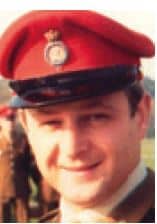Richard D.L. Vaughan-Griffith Military Soldier and businessman was born on December 5, 1945. He died of cancer on 4 January 2012, aged 66.

Towards the close of the campaign in South Arabia in 1967, when all initiatives to hand over political power to a responsible successor administration had failed, British Forces had taken up a semi-circular defence of Aden port, town and outlying suburbs in preparation for complete withdrawal.
Despite HMG’s declared intention to leave, the two local terrorist organisations continued to compete for support among the resident and immigrant Yemeni populations by the ferocity of their attacks on British positions and installations.
The outlying district of Al-Mansoura, to the north of the port, was held by the 1st Battalion The Lancashire Regiment, supported by ‘C’ Squadron The Queen’s Own Hussars. Al-Mansoura and the neighbouring district of Sheik ‘Othman were subjected to intensive attack by day and night, as the terrorists were able to pull back to the safety of the Western Aden Protectorate no longer under British control.
On the morning of September 8, a foot patrol of The Lancashire Regiment was ambushed in a built-up area of Al-Mansoura and took cover in two nearby houses. Intense machinegun and rifle fire from surrounding buildings kept the patrol from breaking out and two men were wounded.
The patrol commander called for support by radio and Second Lieutenant Vaughan-Griffith, with a half troop of ‘C’ Squadron QOH, was instructed to go to the patrol’s assistance.
The task was complicated by difficulty in distinguishing the two houses where the patrol had taken cover from those from where the terrorists were firing. Vaughan-Griffith eventually pinpointed one house by a beret held out of a window on the end of a broomstick.
Suppressing the terrorists’ fire with his vehicle’s Browning machine-guns, he called forward a Saracen armoured personnel carrier from his squadron base and manoeuvred it into a position to allow the infantrymen in one of the houses to climb in through the vehicle’s rear doors.
Having escorted the Saracen to safety at The Lancashire Regiment’s base, he returned to the scene and extracted the remaining infantrymen by reversing the Saracen up to the house where they had taken cover, allowing them to climb in the rear.
In course of the two actions, which extended over a period of two hours, it was estimated that six terrorists were killed and seven others wounded.
During each evacuation, Vaughan-Griffith was obliged to keep his scout car stationary, so he could see clearly what was happening and maintain radio contact with the other vehicles.
The citation of his MC praised his outstanding courage and leadership.
This exposed his car to attack by “Blindicide” anti-tank bazookas, with which the terrorists were known to be well supplied, and also to the threat of a grenade being lobbed into his vehicle turret from the upper storey of one of the nearby buildings.
The citation for the Military Cross awarded to Vaughan- Griffith four months later praised his action under the most difficult conditions, his outstanding courage, leadership and determination.
A week or so after this incident, his Saladin armoured car ran over an anti-tank mine that blew off one complete front wheel station and slightly injured his driver and gunner.
Although himself shaken by the explosion, he helped his injured crew-men into the back of an accompanying Saracen APC, in the course of which they came under terrorist fire, and photographed his damaged vehicle before taking cover in the Saracen.
Richard Derek Lloyd Vaughan-Griffith was the son of Colonel Trevor Vaughan-Griffith, who served in Probyn’s Horse of the Indian Army before transfer to the British Army on the grant of independence to India in 1947.
The family lied in Suffolk, and Vaughan-Griffith attended Framlingham College, where he excelled on the sports field, before going to RMA Sandhurst from where he was commissioned into the Queen’s Own Hussars in December 1966.
After service as a troop leader in Aden and Hong Kong and as a Squadron second-in-command in Germany, he was posted to Sandhurst as an instructor. He later served as Adjutant of the Queen’s Own Hussars before leaving the army to begin a career in the security business.
Following a period undertaking kidnapping negotiations on behalf of the Lloyd’s insurance market and then as managing director of a United Kingdom-based risk management consultancy, in 1992 he formed MacIvor Grant Ltd to undertake a contract with a drilling company operating in Indonesia and Pakistan.
The company was successful and it expanded first into international risk consultancy and then political risk analysis. It later opened an office in Houston, Texas specialising in services to the global oil industry.
A natural sportsman very popular with his brother officers and his men, Vaughan-Griffith maintained regular contact with is old troop sergeant until the latter’s death last year.
He was instrumental in organising the informal gatherings of regimental friends known as the Rocking Horse Lunches an irreverent reference to the white Horse of Hanover cap badges of The Queen’s Own Hussars.
He married first Jan Halliley, by whom he had a son and daughter, and second Jennifer Young, all of whom survive him, together with a stepson and stepdaughter.


